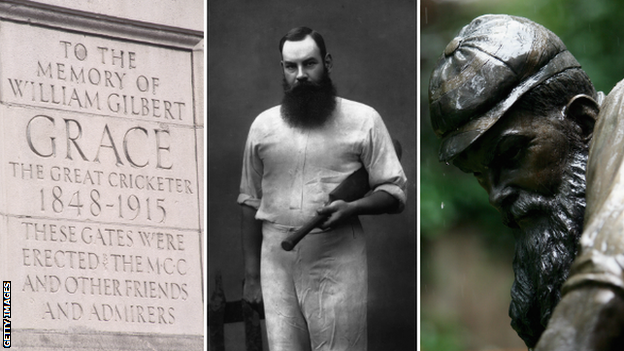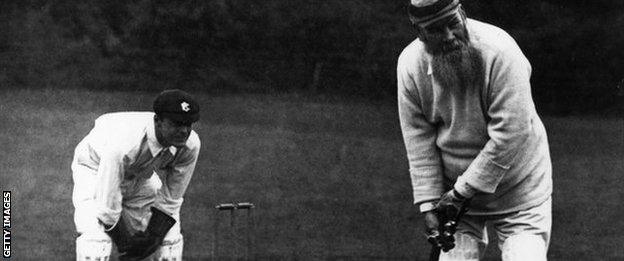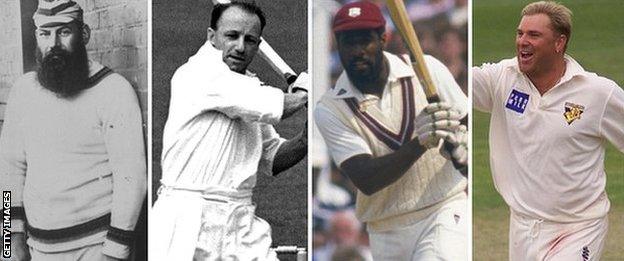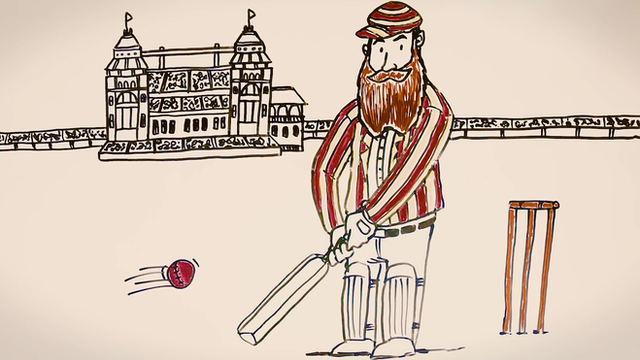WG Grace: 100 years since death of England's cricketing icon
- Published

The Grace Gates at Lord's are named after WG Grace in recognition of his achievements in cricket
For a man who played his cricket in an era of poor pitches and limited time for practice, WG Grace was nothing less than a phenomenon.
Over the course of 43 years, WG (if you don't already know, the initials stand for William Gilbert) scored 54,211 first-class runs, including 124 centuries, and took 2,809 wickets and 876 catches.
Friday marks the centenary of the death of the man they call 'the father of the game', the original 'beard that was feared'.
Radio 4 celebrates Grace centenary | |
|---|---|
Sport's first 'superstar'
WG Grace was born in Downend, near Bristol in 1848 and to many that play the game, he is known as "the greatest". Former England and Gloucestershire wicketkeeper Jack Russell is one who is well aware of the impact of Grace both locally and internationally.
The most famous celebrity in Bristol
"I don't think you realise until you delve into it what a big superstar he was," Russell told BBC Inside Out West.
"In cricketing terms he was massive. Everything he achieved in those early days in the game set the platform for the history of the game. If you spoke to a lot of people outside of cricket who don't know a great deal about the sport, I'd be surprised if they hadn't at least heard of WG."
Grace is widely credited with transforming cricket, external with his performances for both Gloucestershire and England and his legacy lives on at Nevil Road - 100 years after his death.
"I remember playing as a youngster at the County Ground and we used to sleep in sleeping bags in the changing room," added Russell.
"There was this room that was always locked but we knew it was full of old dusty memorabilia and in the middle of the night you could sometimes here footsteps and creaking floorboards. Our coach Graham Wiltshire used to say if you lot mess about, WG will come down and get you. I didn't see him but I heard him."
Grace in numbers
Grace made his Test debut against Australia at The Oval in September 1880, scoring 152, and two years later was in the side which lost at the same ground, marking the birth of the Ashes.
He made his highest Test score of 170 in 1886, again at The Oval, but in 1892 became the first England captain to surrender the Ashes urn when they were beaten 2-1.
In 1895, at the age of 47, he scored 1,000 runs before the end of May, completed his 100th century and eventually totalled 2,336 runs, external that summer.
His score of 318 not out against Yorkshire in 1876 stood as a Gloucestershire record for 128 years, external until it was beaten by Craig Spearman (341) in 2004.
Overall Test record 1880-1899 | |
|---|---|
Batting | Bowling |
Matches: 22 | Overs: 146 |
Innings: 36 | Maidens: 65 |
Runs: 1098 | Runs: 236 |
Highest score: 170 | Wickets: 9 |
Centuries: 2 | Best bowling: 2-12 |
Average: 32.29 | Average: 26.22 |
'Grace was the greatest'
Piers Morgan, former editor of the Daily Mirror and lifelong cricket enthusiast, once nominated WG Grace as the greatest English player of all time.

WG Grace was the first cricketer to score 100 first-class centuries
"Boxing gave us Muhammad Ali, football you would have Pele, and in cricket Grace was the greatest. Botham rolled into Flintoff rolled into John Bull," Morgan told BBC Radio 4's Great Lives in 2006.
"He had everything. He was physically imposing, he was comfortably the best player of his generation, if not all time.
The life and times of WG Grace
"He was there when cricket became not just a village green pastime but became a proper international sport and it needed an iconic figure to make that transition work and to bring the English public with him and Grace did that magnificently."
Former BBC Test Match Special commentator and 'voice of cricket', the late John Arlott, was another to have no doubt about Grace's stature within the game.
"Look back through the swirl of two World Wars to any one of 1,000 English cricket fields and see there a tall man with a ringed red and yellow MCC cap perched on his head," he said.
"A huge black beard falling down across his barrelled chest and a cricket bat looking like a toy in his hand and there is the Gloucestershire man of pure country strain who without a moment of unfaithfulness to himself became known to millions because he was not only the greatest cricketer of his age, but also one of the greatest men of his age."
Wisden's all-time World Test XI

Grace, Don Bradman, Viv Richards and Shane Warne were all named in Wisden's greatest team of all time
In 2013 Wisden named four Englishmen, including WG Grace, in an all-time Test World XI to mark 150 years of the Cricketers' Almanack.
Wisden World XI
1. Sir Jack Hobbs (England, 1908-1930)
61 Tests, 5,410 runs at 56.94
2. WG Grace (England, 1880-1899)
22 Tests, 1,098 runs at 32.29
3. Sir Donald Bradman (Australia, 1928-1948 - captain)
52 Tests, 6,996 runs at 99.94
4. Sachin Tendulkar (India, 1989-2013)
198 Tests, 15,837 runs at 53.86
5. Sir Viv Richards (West Indies, 1974-1991)
121 Tests, 8,540 runs at 50.23
6. Sir Garfield Sobers (West Indies, 1954-1974)
93 Tests, 8,032 runs at 57.78, 235 wickets at 34.03
7. Alan Knott (England, 1967-1981 - wicketkeeper)
95 Tests, 4,389 runs at 32.75, 250 catches, 19 stumpings
8. Wasim Akram (Pakistan, 1985-2002)
104 Tests, 414 wickets at 23.62
9. Shane Warne (Australia, 1992-2007)
145 Tests, 708 wickets at 25.41
10. Malcolm Marshall (West Indies, 1978-1991)
81 Tests, 376 wickets at 20.94
11. Sydney Barnes (England, 1901-14)
27 Tests, 189 wickets at 16.43
A born winner and a double life
Grace had another career - as a doctor in the 1880s and 1890s.
"As far as he is concerned, sport is about winning," Richard Tomlinson, author of Amazing Grace, told the BBC.
"It's the only thing that matters, that's what makes him so thrilling to watch.
"He was the first sporting superstar. He was the only superstar for quite some time because he was titanically better than anyone else. He scored 50 first-class centuries by the age of 27. You've got to add up all the centuries scored by the next 13 most prolific batsman in the same period to reach Grace's tally.
"There is this extraordinary double life he leads when he is a doctor in Bristol and he is also the most famous sportsman if not most famous celebrity in the British Empire, which basically means the world."
Dr WG Grace died at the age of 67 on 23 October 1915 at his home in Kent, having suffered a cerebral haemorrhage, but his legacy as the greatest of them all lives on.
Listen again to Jonathan Agnew's "Remembering WG Grace" programme, which is available as a podcast.
- Published23 October 2015

- Published18 October 2019
